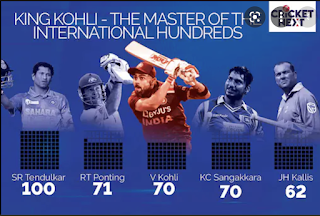As is every Indian, I grew up watching and obsessing over cricket. From Kapil Dev to Sachin to Dhoni to Kohli, from Richards to Warne to Murali to Stokes, cricket has been an indelible part of life. Over different periods I have obviously been exposed and obsessed with other sports - be it Tennis, Badminton, Hockey, Soccer, American Football, Chess , Formula 1 , but it would be fair to admit that cricket has been a constant part of life.
Growing up, my dad bought me a book which had all ODI stats will around 1987. It was like cricinfo statsguru in paperback format and a dream of a 6 year old who loved maths. Unsurprisingly, West Indies, the then-dominant force in ODI cricket with a set of powerful cricketers across all dimensions - Richards , Greenidge and Haynes sharing all possible batting records, Garner , Holding and W. Davies with bowling and Dujon completing the circle with powerful wicketkeeping.
Over the years, Pakistan, SL , Australia have had their share but the dominance of that era has been great. Records deemed impossible once in the past (the first time India ever scored 300 in a 60-over, 55 -over or 50 over match was in 1996 , being the last regular country - even after SL and Zimbabwe did it) now became the new normal. Haynes' once secure record of 17 centuries is now just a "special mention". 300 became cricket's new 200, an individual score of 150 became a century and a once impossible 200 became common.
But of course, cricket has been subject to an intense debate - one of the most memorable events of them being Tendulkar stranded on 194, just to make sure India left no stone unturned in getting a win. On the other hand, Lara's 400 has been called an extremely selfish innings, and while Sachin has been spared the flak most times, his 100th 100 did come under scrutiny after India lost the match against Bangladesh.
So then, as all players are trained to say - "We don't play for records" OR more subtly "I am not as happy about the double hundred as I am happy that it made India win it's zillionth match against Sri Lanka , is it really the truth?
My opinion is - that is the paradox of cricketing records. And at the risk of sounding callous, I'll say that the "I only want my team to win and not care about breaking the record" is just diplomatic lies. Every player wants their team to win, of course, but if I had taken 9 wickets in an India - Sri Lanka test match, would I still wish someone else would take the 10th and race India to a forgettable test victory or would I wish that I take the 10th, even if it means risking a draw in a series that would be forgotten within weeks if not days?
Of course, the other extreme is also not justified . If everyone simply played for records, the non-striker would never run with passion for his or her partner. People would not push the pace of a game risking their own wickets. Prabhakar's super slow selfish play is certainly not correct. Just as Lara's 400 wasn't . But then , we saw a glimpse of it in Ajaz' 10-for, where he set a memorable record but the team lost
Which brings me to the actual moral of this article. Different entities in cricket, broadcasters, statisticians, portals like cricinfo have somehow managed to bring records to the foray in an otherwise team-oriented game. And they are not to blame, it is eventually their consumers - which span various ages and social classes who are fascinated by records. And unlike other spots where the records are always in line with the goals of winning (eg: soccer where the more goals someone scores, the better it is, OR tennis, which is an individual sport to begin with), cricket can be played with 2 different approaches of either winning the game or setting individual records. And while international matches , where one plays for the country might be some exception, the 664 run partnership is a great example where kambli and tendulkar were able to create the record only because their coach was not on the ground and they continued to go against the "set" principles
The paradox of whether records are important or winning is important has evolved unintentionally but certainly will be the talk for at least a few decades.

No comments:
Post a Comment